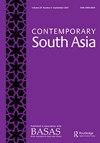种姓政治、少数民族代表和社会流动:印度穆斯林种姓的社团生活
IF 0.8
3区 社会学
Q3 AREA STUDIES
引用次数: 0
摘要
南亚穆斯林的社会分层,特别是穆斯林种姓现象,最近引起了学术界和媒体的关注,特别是在印度。然而,公众讨论——通常经验浅薄且政治两极化——未能充分解释穆斯林在援引平等主义原则的同时使社会不平等持续存在的机制。这个特别的部分是基于2022年BASAS年会的一个小组,旨在通过倡导对穆斯林种姓协会的研究,为学术和公共话语做出贡献。考虑到种姓的交往生活提供了一个有形的研究对象。此外,它将焦点从宏观层面的讨论转移到中观和微观层面的基于经验的分析。本导论探讨了两个中心方面。首先,我们认为种姓关联为研究穆斯林社会流动提供了一个新的视角,超越了人们通常认为的对主流种姓群体的模仿或Ashrafization。其次,记录种姓关系有助于我们理解穆斯林代表的多样性,特别是穆斯林少数民族政治与穆斯林种姓政治之间的紧张关系。总的来说,这一特殊章节提供了穆斯林与种姓联系的多个例子,其中包括政治主张、解密、社会排斥或普遍慈善愿望等各种各样的努力。本文章由计算机程序翻译,如有差异,请以英文原文为准。
Caste politics, minority representation, and social mobility: the associational life of Muslim caste in India
ABSTRACT
Social stratification among Muslims in South Asia, specifically the phenomenon of Muslim caste, has recently gained scholarly and media attention, particularly in India. However, the public discussion – often empirically shallow and politically polarized – fails to adequately explain the mechanisms through which Muslims perpetuate social inequality while invoking egalitarian principles. This special section, based on a panel held at the 2022 BASAS annual conference, aims to contribute to the scholarly and public discourse by advocating for the study of Muslim caste associations. Taking the associational life of caste into account provides a tangible object of study. Moreover, it shifts the focus away from macro-level discussions towards an empirically grounded analysis at the meso- and micro-levels. This introduction explores two central aspects. First, we suggest that caste associations offer a fresh perspective on the study of Muslim social mobility, beyond the oft-assumed imitation of dominant caste groups or Ashrafization. Second, documenting caste associations helps us understand the diversity of Muslim representation, specifically, the tension between Muslim minority politics and Muslim caste politics. Overall, this special section provides multiple examples of Muslims’ associational engagements with caste, which encompass endeavours as diverse as political assertion, declassing, social exclusion, or universal charitable aspirations.
求助全文
通过发布文献求助,成功后即可免费获取论文全文。
去求助
来源期刊

Contemporary South Asia
AREA STUDIES-
CiteScore
2.10
自引率
0.00%
发文量
82
期刊介绍:
The countries of South Asia - Bangladesh, Bhutan, India, Maldives, Nepal, Pakistan and Sri Lanka - are internally diverse and part of global flows of people, goods and ideas. Contemporary South Asia seeks to address the issues of the region by presenting research and analysis which is both cross-regional and multi-disciplinary. The journal encourages the development of new perspectives on the study of South Asia from across the arts and social sciences disciplines. We also welcome contributions to pan-regional and inter-disciplinary analysis. Our aim is to create a vibrant research space to explore the multidimensional issues of concern to scholars working on South Asia and South Asian diasporas in the postcolonial era.
 求助内容:
求助内容: 应助结果提醒方式:
应助结果提醒方式:


